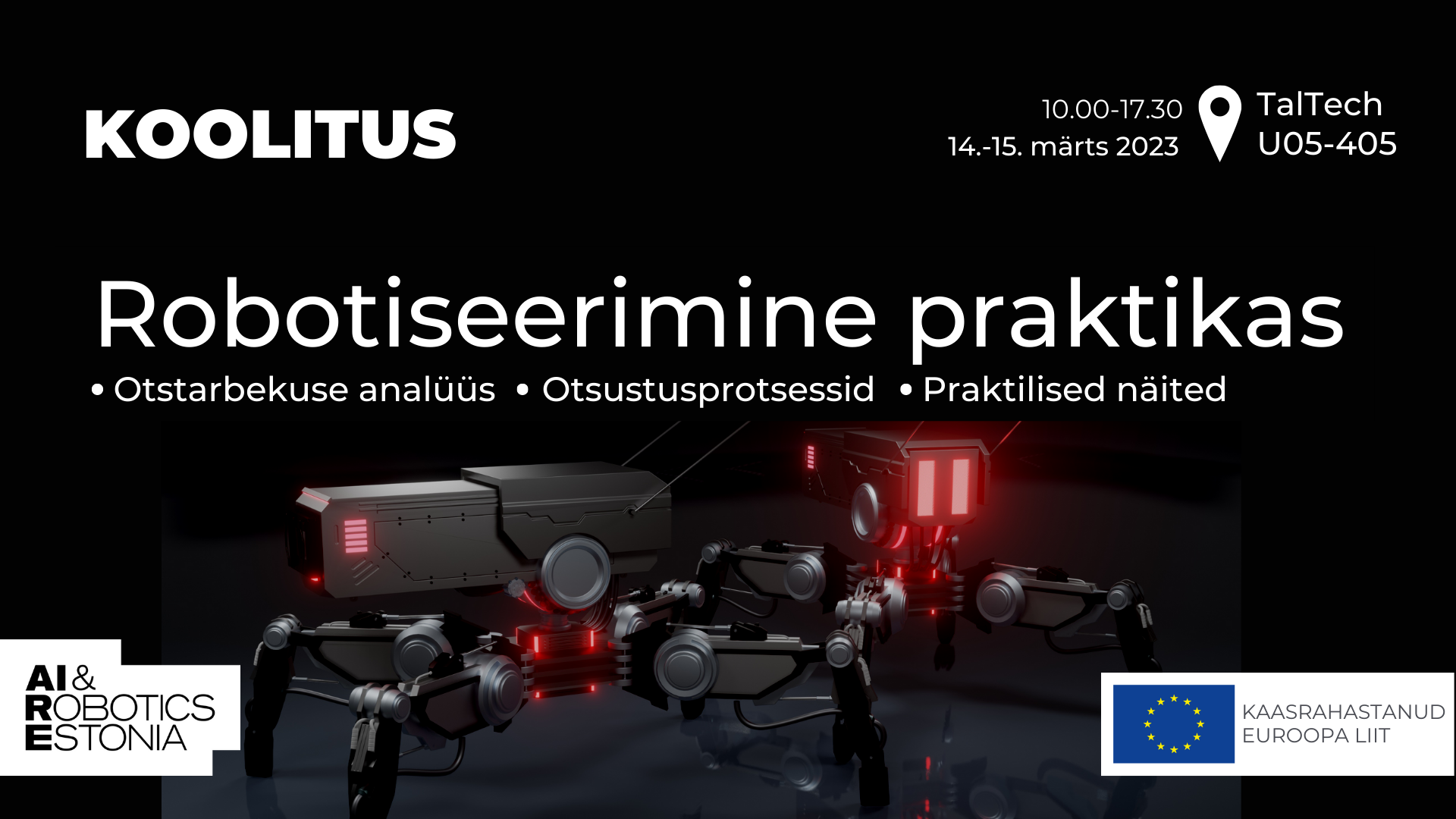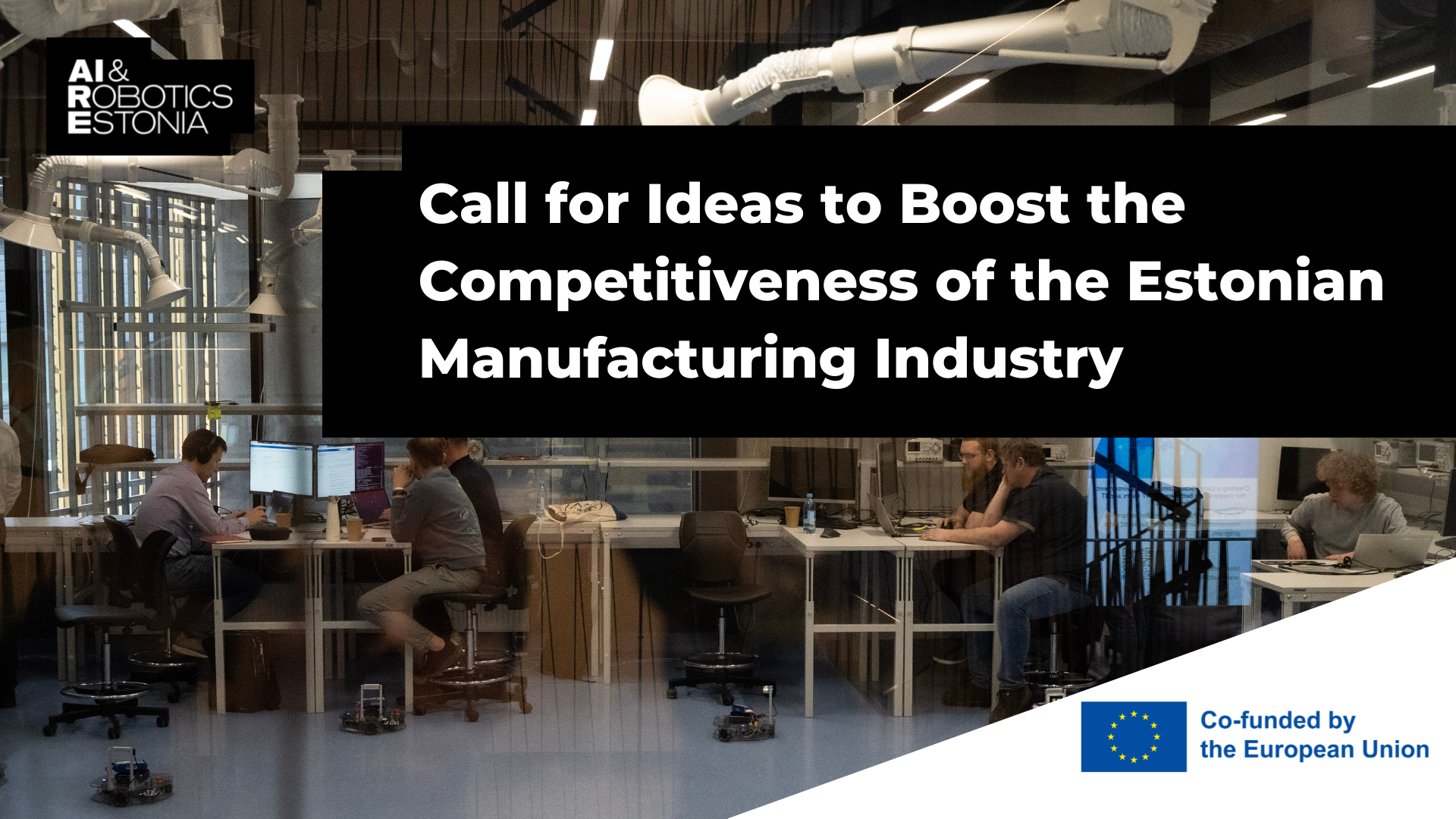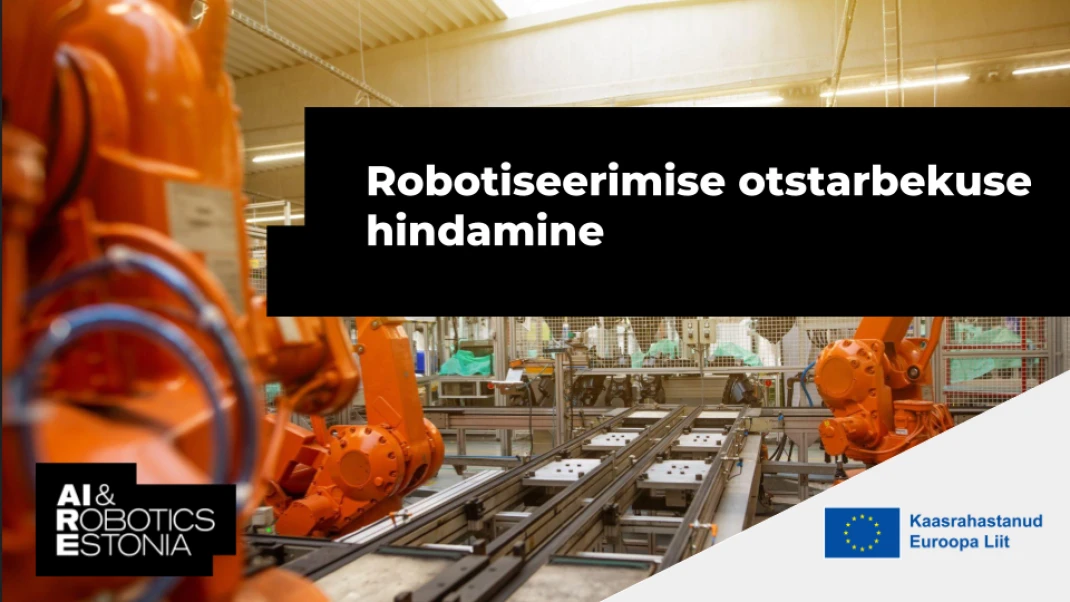In the two-day course, we will talk about the nature and practical implementation of robotization feasibility analysis and the decision-making process. Using the example of the company’s user experience, we present the practical use of robots in industry. We will share knowledge on improving the use of a robotic workplace using the example of robot bending. We introduce the possibilities of using modern technologies in the robotization of workplaces.
When participating in the training, the company receives minor assistance (VTA) in the amount of €480 per participant.
TARGET GROUP
Small and medium-sized processing industry (EMTAK C) and manufacturing companies are welcome.
The courses are aimed at employees of industrial companies who want to gain knowledge about the practicality and possibilities of production robotization. In professions: company managers, industrial managers, development managers, production managers, engineers, foremen, foremen, etc.
The training is conducted by Jüri Riives, an experienced lecturer in the field of Technology Development Center IMECC, and Madis Moor, a lecturer at Tallinn University of Technology.
PURPOSE
The aim of the course is to provide practical knowledge about the feasibility analysis and decision-making process of robotization and the use of robots in solving technological tasks in the company.
TOPICS
1. Analysis of feasibility of robotization (4 credit hours), Jüri Riives
2. Company-centered vision of the practical use of robots (4 credit hours)
3. Improving the use of a robotic workplace using the example of robot bending (4 ac.h), Madis Moor
4. Possibilities of using modern technologies in the robotization of workplaces (4 credit hours)
Upon successful completion of the training, students will gain the knowledge of:
• Robotization feasibility analysis models and practical analysis execution skills;
• Knowledge and skills for making practical decisions in the field of robotics
• Knowledge and skills to select the appropriate robot depending on the task
• Knowledge of the nature, design and use of a robotic workplace
• Knowledge of performance measurement and evaluation
• Knowledge and ability to assess the risks of robotization and mitigate them
• Knowledge of using IoT and M2M solutions
• Knowledge of the principles of integrated production
• Knowledge of data collection and data analytics
• Practical examples of how to choose a robot
• Practical examples of robot workplace integration and implementation
• Practical examples of the use of robots in industry
➠ Those who complete the training will receive a certificate of completion from IMECC OÜ.
The deadline for registering for the training is December 7.
TERMS OF PARTICIPATION
• The condition for participating in the course is to fill in the AIRE digital maturity assessment form for your industrial company. More detailed information will be sent to your e-mail after registration.
• The minimum number of participants for the training is 15.
• Up to 2 people from one company can participate.
• Participation in the course is free for companies of the target group that have a free limited aid (VTA) limit (the limit for granting aid is 200,000 euros per company over three financial years).
• In the event of participation in the training, the company is given minor aid by the state in the amount of €480, per participant.
• By registering for the course, the company gives permission to use the VTA balance for participation, which is non-refundable in case of non-participation or interruption of the training. *Participation can be canceled up to 10 working days before the start by sending an e-mail to koolitused@aire-edih.eu
• If desired, it is also possible to participate in the training on the basis of an invoice (including employees of large companies). The invoice sent to the e-mail must be paid before the start of the training by the payment deadline indicated on the invoice.
For more detailed information, contact us at +372 564 58870 Kaia Lõun (technical support) / +372 50 10107 Jüri Riives (questions about the course content) or koolitused@aire-edih.eu
We invite you to participate in the course to gain knowledge about the feasibility analysis and decision-making process of robotization and the practical use of robots in industry.
SCHEDULE
First training day 13.12.2022
1. Analysis of feasibility of robotization (4 ac.h) – Jüri Riives (IMECC)
1.1 The starting points and risks of robotization feasibility.
1.2 Choice of decision criteria and rationale. Robotization feasibility analysis models and their practical use.
1.3 Solution examples, interpretation of results and decision making.
1.4 Next Steps: Installation, Integration and Deployment.
2. Company-centered vision of the practical use of robots (4 credit hours)
2.1. Classification and functionality of ABB robots.
2.2. New trends and developments in the design and use of robots.
2.3. Practical example of use: why to use and how to choose a robot.
2.4. Practical use case: how to integrate a robot into a company’s workplace and deploy it for use.
Second training day 14.12.2022
3. Improving the use of a robotic workplace using the example of robot bending (4 ac.h) – Madis Moor (TTKK)
3.1. The nature and practical use of the robotic workplace.
3.2. Production cycle: planning and execution (practical examples).
3.3. Selection and use of tools (practical examples).
3.4. Using a robotic workplace. Performance measurement and assessment
4. Possibilities of using modern technologies in the robotization of workplaces (4 credit hours)
4.1. Designing a modern robotic workplace.
4.2. Using IoT and M2M solutions.
4.3. Principles of integrated production.
4.4. Data collection and data analytics.
TEACHERS
Jüri Riives is the founder of IMECC OÜ and a professor at Tallinn University of Technology. Jüri has been the chairman of the board of the Estonian Machinery Industry Union for a long time (1999-2009). Jüri has extensive business experience, he is an expert in industrial robotics, digitalization, cost-effective production (including Lean) and the development of industrial business models.
Madis Moor is a lecturer at the Technical Institute of Tallinn University of Technology.
Check out the constantly expanding AIRE training program HERE.
The artificial intelligence and robotics center AIRE (EDIH) is financed by the European Digital Innovation Centers sub-programme of the Digital Europe Program and the Ministry of Economic Affairs and Communications (Project no.: 101083677).



